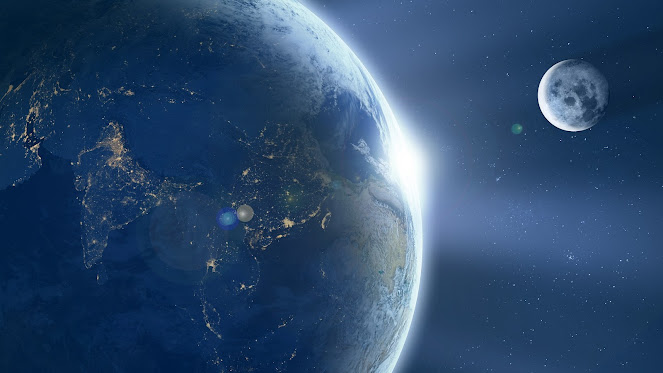THE MOON IS DRIFTING AWAY FROM EARTH
For
centuries, the Moon has been a constant companion in the Earth's night sky,
lighting up our world with its reflected sunlight. However, recent scientific
discoveries have revealed that this celestial object is slowly drifting away
from us, at a rate of 3.8 centimeters per year. This gradual shift is having a
significant impact on our planet, affecting everything from our climate to the
length of our days.
Scientists
have long been aware that the Moon's gravitational pull affects the Earth's
tides, causing them to rise and fall with the lunar cycle. However, it was
previously believed that the Moon remained at a constant distance from Earth
due to this gravitational force. Recent research has challenged this assumption,
showing that there is actually an ever-weakening connection between the two
celestial bodies.
This
weakening connection has caused the Earth to spin slower, resulting in longer
days. In fact, scientists believe that the Moon used to be much closer to
Earth, causing days to be as short as 18 hours 1.4 billion years ago. By
studying ancient sediment, researchers have been able to recreate what the
solar system looked like in the distant past and track the Moon's movement over
time.
Astrochronology,
the method of linking astronomical theory with geological observation, has
played a crucial role in this research. By studying the Earth's climate cycles
and the evidence left in sediment, scientists have been able to measure the
planet's "wobble" and determine the distance of the Moon from Earth
in the past. They have discovered that around 2.46 billion years ago, the Moon was approximately 60,000 kilometers closer to Earth than it is today, resulting
in 17-hour days.
What Does This Mean for Our Planet
The
fact that the Moon is drifting away from Earth has important implications for
our planet's future. As it moves further away, days will continue to get
longer, which could have a significant impact on our environment. Changes in
the length of daylight hours could affect the behavior of animals and plants,
and alter the timing of important natural events such as migrations and
flowering.
The
Moon's movement also has implications for space exploration and colonization.
With NASA already awarding contracts for the development of technology to build
habitats and roads on the Moon, the question of territorial disputes could
arise if different nations attempt to claim different parts of the Moon as
their own. Furthermore, the fact that the Moon is drifting away from Earth
means that any potential colonists may have to contend with longer commute
times back to our planet.
Despite
the Moon's slow and steady movement away from Earth, it is important to note
that it is still a vital part of our planet's ecosystem. From controlling the
tides to providing light during the night, it plays a crucial role in our
planet's delicate balance. As scientists continue to study the Moon's movement
and its impact on Earth, we can gain a better understanding of our planet's
past, present, and future.


